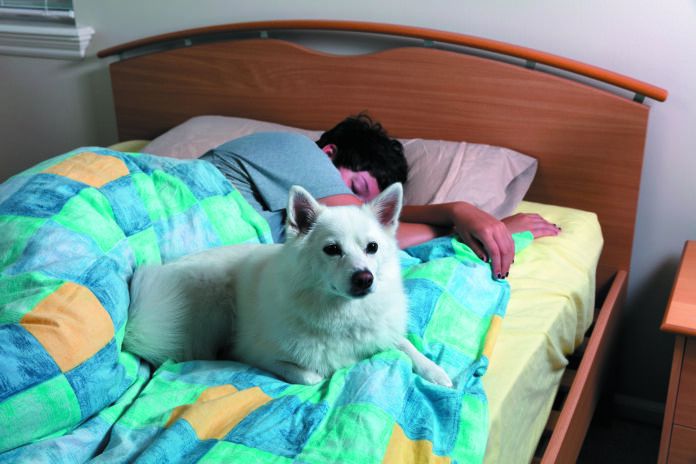It’s people with cats who frequently say their pet can’t settle in for the night and keep them up with their weehour wanderings throughout the house. Those with dogs often just complain that their pet hogs the bed. But there are plenty of dogs who experience nocturnal disturbances, too. Unlike with cats, the reasons for their difficulty staying calm at night can be quite serious, requiring your intervention. Here are four possibilities to consider for a dog’s late-night anxiety.
1. Medical Condition. People experiencing pain often feel it more acutely at night, making it difficult for them to drift off, and the same could be true for dogs. During the day various distractions can push pain to the background, but in the middle of the night there’s nothing but the dark and the clock ticking. At least one children’s hospital even has a handout telling parents of cancer patients that their child may have trouble sleeping.
Pain can be tricky to find. We had one case of a dog being treated with both pain killers and anti-anxiety medication because he could not calm down when it was time to sleep. But the reason behind any possible pain couldn’t be ascertained. Then, one day when the dog was walking, a bone broke in one of his legs. It turned out he had cancer in the form of multiple myeloma, and his bones were hurting before a clinician could pick up on it.
In yet another case, a dog was experiencing nighttime panic whose root cause also couldn’t be figured out. Some months later, his eye started to bulge out; he had a tumor growing there. Once the tumor was excised, the nighttime panic dissipated.
2. Canine cognitive dysfunction. Some people with Alzheimer’s develop sundowner’s syndrome. They become more active when it is time to sleep. So it goes with some dogs who have the canine version of Alzheimer’s — canine cognitive dysfunction. They end up pacing back and forth throughout much of the night. If your older dog has a constellation of symptoms suggestive of canine cognitive dysfunction — disorientation, changes in interactions with people and other dogs, house-soiling — alterations in her sleep-wake cycle could be part and parcel of the pattern.
3. Nighttime noise phobia. Noise that you don’t pay any attention to can make some dogs pant and salivate. If your dog has neither a medical problem nor dementia, put on a tape recorder one night to see if any particular noises get her going. You may be surprised to find that what’s way in the background for you could be front and center for your pet.
Sometimes it’s seasonal. We once had a dog who slept fine in the warm weather but started becoming anxiously aroused at night when the cold set in and the heating system came on. The boiler was a replacement for one the dog had been used to, and whenever it started it gave a rather noticeable clunk. The animal found the noise, coming from the cellar where she could not explore the cause, exceedingly scary. For other dogs it could be the sound of snow plows going by or something else that you yourself don’t pay attention to because it’s so routine.
4. Post traumatic stress disorder (PTSD). Because dogs don’t have language, we can’t know for sure whether they have nightmares or flashbacks that force them to relive awful experiences like a person with PTSD. But researchers have fond that some military dogs are unable to go back to their jobs as bomb sniffers after exposure to combat, and veterinary behaviorists both at Tufts and elsewhere have worked with plenty of dogs in civilian contexts who appear to be affected by trauma in much the same way as canine soldiers.
Thus, it’s very possible that some anxious dogs psychologically return to the traumatic turning point in their lives during the night, keeping them up and anxious even though they are safe. It’s akin to a soldier coming back from battle and being afraid to drive under an overpass. It’s perfectly safe, but it reminds them too much of having to keep watch for enemy snipers. After physical ailments and other causes of nighttime restlessness have been ruled out, the idea of a dog being spooked because of past experiences may be considered — and treated in part with anti-anxiety medications.





